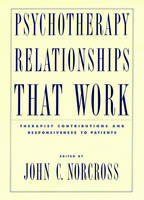
Psychotherapy Relationships That Work
Oxford University Press Inc (Verlag)
978-0-19-514346-1 (ISBN)
- Titel erscheint in neuer Auflage
- Artikel merken
Many efforts to improve therapy have focused on codifying evidence-based treatments, but in doing so have left the psychotherapeutic relationship behind. Psychotherapy Relationships That Work is the first book to assemble the numerous advances in understanding the critical relationship between the clinician and the patient into one accessible volume. The volume brings together a distinguished group of psychologists to take stock of which elements of the therapy relationship work, which look promising, and how relationships can be customised to the individual patient. It represents the culmination of three years of systematic analysis on the part of the APA Division 29 Task Force on Empirically Supported Therapy Relationships to identify, operationalize, and disseminate information on empirically supported therapy relationships. These eminent researchers and clinicians examined the empirical research done to date that illuminates the therapeutic relationship as well as the evidence-based practices that may be used to cultivate and customise that relationship.
Each chapter defines the relationship or patient quality - such as empathy, congruence, or attachment style - provides clinical examples, reviews the empirical research and highlights therapeutic practices ensuing from the research results. The volume concludes with recommendations and a discussion of the implications for future training, research and policy. Psychotherapy Relationships That Work will be an indispensable reference for all mental health practitioners, including psychiatrists, psychologists, clinical social workers, counselors and mental health consultants.
Part 1: Introduction; 1. Empirically Supported Therapy Relationships; 2. Research Summary on the Therapeutic Relationship and Psychotherapy Outcome; Part 2: Effective Elements; A: General Elements of the Therapy Relationship; 3. The Alliance; 4. Cohesion in Group Therapy; 5. Empathy; 6. Goal Consensus and Collaboration; B: Customizing the Therapy Relationship to the Individual Patient; 7. Resistance; 8. Functional Impairment and Coping Style; Part 3: Promising Elements; A: General Elements of the Therapy Relationship; 9. Positive Regard; 10. Congruence; 11. Feedback; 12. Repairing Alliance Ruptures; 13. Self-Disclosure; 14. The Management of Countertransference; 15. Relational Interpretations; B: Customising the Therapy Relationship to the Individual Patient; 16. Stages of Change; 17. Anaclitic/Sociotropic and Introjective/Autonomous Dimensions; 18. Expectations and Preferences; 19. Assimilation of Problematic Experiences; 20. Attachment Style; 21. Religion and Spirituality; 22. Cultural and Demographic Diversity; 23. Personality Disorders; Part 4: Conclusions and Guidelines; 24. Empirically Supported Therapy Relationships: Conclusions and Recommendations of the Division Task Force; Appendix A: Chapter Guidelines; Appendix B: Evaluation of Research Studies
| Erscheint lt. Verlag | 22.8.2002 |
|---|---|
| Zusatzinfo | 4 line illustrations |
| Verlagsort | New York |
| Sprache | englisch |
| Maße | 176 x 254 mm |
| Gewicht | 955 g |
| Themenwelt | Medizin / Pharmazie ► Medizinische Fachgebiete ► Psychiatrie / Psychotherapie |
| ISBN-10 | 0-19-514346-9 / 0195143469 |
| ISBN-13 | 978-0-19-514346-1 / 9780195143461 |
| Zustand | Neuware |
| Haben Sie eine Frage zum Produkt? |
aus dem Bereich



